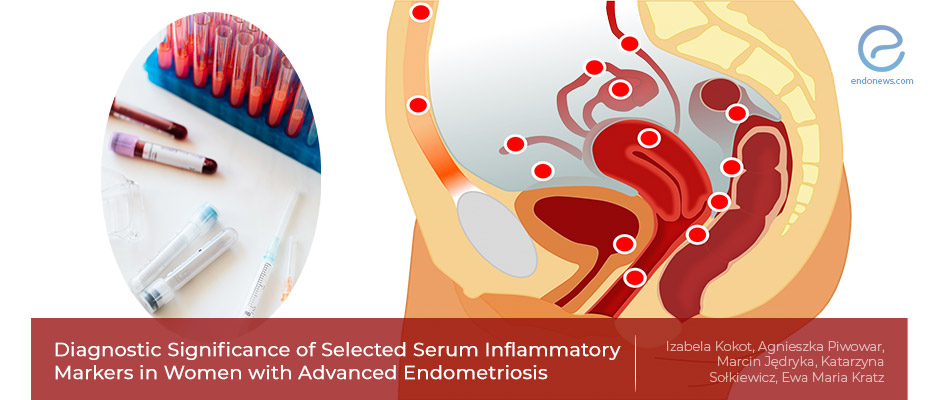Selected Blood Inflammatory Biomarkers May Help Identify Endometriosis
Apr 2, 2021
A set of inflammatory biomarkers in the blood could help identify women with advanced-stage endometriosis who could qualify for treatment.
Key Points
Highlights:
- Levels of certain biomarkers in the blood differ between women with endometriosis and those without the disease. Levels are also different depending on the stage of endometriosis.
Importance:
- These biomarkers could be used to identify women with advanced endometriosis as a non-invasive marker, so that the patients can be offered the necessary treatment.
What's done here:
- Researchers studied the levels of six biomarkers and compared them to the levels of a known biomarker of inflammation in the sera of 43 women with endometriosis, 35 women with benign gynecological disorders other than endometriosis, and 18 healthy volunteers.
Key results:
- Levels of inflammatory miomarkers such as IL-1β, IL-6, hs-CRP, YKL-40, PRL, and CA 125 were significantly higher in the blood of women with endometriosis compared to that of healthy volunteers.
- Levels of IgG were significantly lower in the blood of women with endometriosis compared to that of healthy women
- There were significant differences in the levels of IL-6, hs-CRP, and CA 125 between stage 3 and stage 4 endometriosis.
- The levels of IL-6, hs-CRP, and PRL were significantly higher in the blood of women with benign gynecological disorders compared to that of healthy volunteers.
- The level of CA 125 was higher in the blood of women with endometriosis compared to that of women with benign gynecological disorders.
Limitations:
- The study did not include women with early-stage endometriosis. So, it is not possible to tell whether the biomarkers could be used to identify women with early-stage endometriosis.
- A broad range of concentration values was obtained for all the biomarkers, which makes it difficult to draw definitive conclusions.
- The study only analyzed levels of biomarkers in the blood and not in the peritoneal fluid.
- These markers may be high in a variety of inflammatory condition and are not specific to endometriosis.
Lay Summary
Levels of inflammatory biomarkers in the blood differ between women with endometriosis and those without the disease. Levels of some biomarkers also differ according to the stage of endometriosis. This is according to a new study by Polish scientists published in the "International Journal of Molecular Sciences".
Based on this finding, the researchers propose a panel of inflammatory biomarkers that could be used to identify women with advanced-stage endometriosis who could qualify for treatment.
It is already known that endometriosis is a disease that is associated with inflammation, the body's process of fighting harmful factors such as infections, toxins, or injuries to heal itself.
In order to identify inflammatory biomarkers characteristic for endometriosis, a team of researchers led by Dr. Ewa Maria Kratz at Wroclaw Medical University, Poland studied the levels of IL-1β, IL-6, hs-CRP, IgG, YKL 40, and PRL in 96 women. They compared these levels to that of CA 125, a well-known marker of inflammation. Forty-three of the women had endometriosis, 35 had benign gynecological disorders but no endometriosis, and 18 were healthy volunteers. Benign gynecological disorders include uterine fibroids, chronic pelvic inflammatory disease, ectopic pregnancy, or pelvic floor prolapse.
The results showed that the concentration of IL-1β, IL-6, hs-CRP, YKL-40, PRL, and CA 125 were significantly higher in the blood of women with endometriosis compared to that of healthy women.
In contrast, levels of IgG were significantly lower in the blood of women with endometriosis compared to those without the disease.
In addition, there were significant differences in the concentrations of IL-6, hs-CRP, and CA 125 between women with stage 3 and stage 4 endometriosis.
Then, the researchers compared the levels of biomarkers in the blood of women with benign gynecological disorders to those in the blood of healthy women or women with endometriosis. They found that the concentrations of IL-6, hs-CRP, and PRL were significantly higher in the blood of women with benign gynecological disorders compared to that of healthy volunteers. Only the concentration of CA 125 was significantly higher in the blood of endometriosis patients compared to those with benign gynecological disorders.
“The proposed panel of inflammatory markers, especially IL-6, PRL, and CA 125, may become a useful tool to identify women with advanced endometriosis who could qualify for treatment,” the researchers concluded.
Research Source: https://pubmed.ncbi.nlm.nih.gov/33669013/
Biomarker blood inflammation IL-1β IL-6 hs-CRP YKL-40 PRL CA-125 stage 3-4 endometriosis

